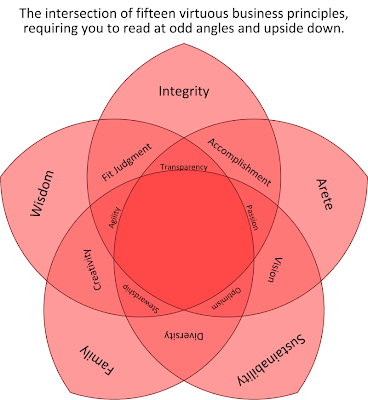When I first began to seriously budget, I had very little disposable income and a near-pathological debt aversion*. As a result, I have an up to date plan that lets me tell to the cent the full valuation of my estate. [This is only a slight exaggeration as anyone who has seen my budget can attest.] That visibility into my financial position is important to me, but not as important as the ability to look at trends in my spending behavior.
At the end of every year, I examine how I spent my money. I view it against what and how I spent in previous years. I look at whether, how, and why I met my goals. Then I make notes on which behaviors I should keep and which I should attempt to change. Thankfully, I only need to aggressively revisit my retirement projections once every four or five years – it is an awful pain to crawl that data and tweak it to accommodate reality.
This year, several things are clear to me:
- Provided that I continue to meet or exceed my savings goals, I will retire˚˚ 10-15% earlier than I anticipated – at about age 45 for simple living or at 55 for comfort.
- As I earn more money, I grow increasingly casual about luxury spending. Ten years ago, I would have saved for a year to buy myself a liter of my favorite Sicilian olive oil. I bought four this year. While I have never spent beyond my means, I have taken to blowing windfalls on straight luxury.
- As my standard of living rises, I have a very hard time imagining lowering it, even in lieu of any need to do so. I know, it’s ever so shocking.
A finance site I started following this year is My Open Wallet. The blogger there keeps her identity a secret. This isn’t a bad idea considering her premise and content. Though I am generally against anonymity and secrecy, there is a certain degree of crazy around publishing one’s personal finances online¹. I know from experience that I run a company’s budget very like I run my own. So without revealing any specific dollar-by-dollar breakdowns, here’s a high level [jargon] peek into my 2007 books:
- 63.3% Savings (401k, 529, IRA, other investment)
- 12.2% Rent and utilities (including phone)
- 6.4% Travel (Argentina/Uruguay, China/Hong Kong)
- 4.3% Entertainment (restaurants, media, events)
- 3.9% Groceries and supplies
- 3.8% Cuisine-related luxuries (coffee, wine, dinner parties)
- 3.1% Owning and operating a car
- 1.8% Giving
- 1.2% Health and fitness
I did well with overall fiscal responsibility…
- I increased both my income and my wealth over the previous year beyond the rate of inflation. This has been consistent every year but one since I entered the workforce full time.
- I met my long term savings goal for the year. Actually, I exceeded it well beyond the figures above due to market appreciation and 401(k) matching. In fact, I saved so well that I managed to reduce my anticipated retirement age by a full year (provided that the dollar returns to something like its pre-2004 valuation).
- I kept my housing expenses under my target – by more than a full point – while living alone in Bellevue. Next year, my utilities cost will fall by nearly half (I dropped my cell in favor of VoIP. I will also be moving back into Seattle, sharing an apartment or house. This will reduce my rent and slightly reduce overall utilities.).
…but I did not correct the spendy habits I picked up.
- I took two vacations. Provided I can afford this extravagance, I am fine with spending a significant portion of my disposable income on experiencing global culture. However, I failed to plan for or adequately track my expenses on my trips. Also, excepting Hong Kong and Uruguay, I chose to go to places I ended up generally disliking.
- I lavished 8.1% of my net income on restaurants, music, movies, parties, and what largely amounts to narcissism. It doesn't seem like a lot of money while I'm spending it. It certainly does though when I add up expenses at the end of each month. I did the same thing last year, took a note on it, and failed to change the behavior at all. Provided I'm meeting my savings goals, I do an abysmal job of saying no to entertainment.
- For someone who is supposed to be using a bicycle as his primary mode of transportation, I spent far too much time in my car and money on gas. With a bit of luck, I should be able to halve figure in 2008. Bonus: for every hundred miles I ride rather than drive, I lose about a pound. There’s also that global warming thing.
I’ll close with a couple of ethical dilemmas I have the privilege of wrestling with. Feel free to weigh in if you’d like.
I am now within the bracket of the top 1% richest people on Earth². Of all the money I spent, less than 1/50th o
I continuously struggle with my savings strategy. I intend to be independently wealthy, sufficiently so that I do not have to work except as I freely choose. However, in pursuing this strategy I am effectively stockpiling capital resources. I'm not likely to suffer the claim that I did not earn what I've got. But a strong argument can be made that many will endure hardship or die, explicitly as a result of my stockpiling [My savings strategy is investment-oriented, so I while am accumulating wealth, I am not hoarding]. I am going forward anyway. Once free to do as I please, I can apply as much of my excess income as is reasonably available, a sum that will be increasingly larger than anything I could have achieved without venturing down this path. Or so I tell myself.
Oh yes, one last thing. Welcome back, dear readers.
* An aversion I continue to enjoy.
˚˚ I can’t retire any more than anyone else in my family can. We work. Once "retired", I will simply choose my avocation to align most perfectly with what is uncompromisingly most satisfying for me.
¹ Though I’m leery of publishing them on the web, I probably have no problem sharing my personal finances with you. If you want a closer look at my numbers, feel free to ask. I may still say no, but I’ll have a suitably good reason.
² According to www.globalrichlist.com, which I don’t think has been updated since 2004.








